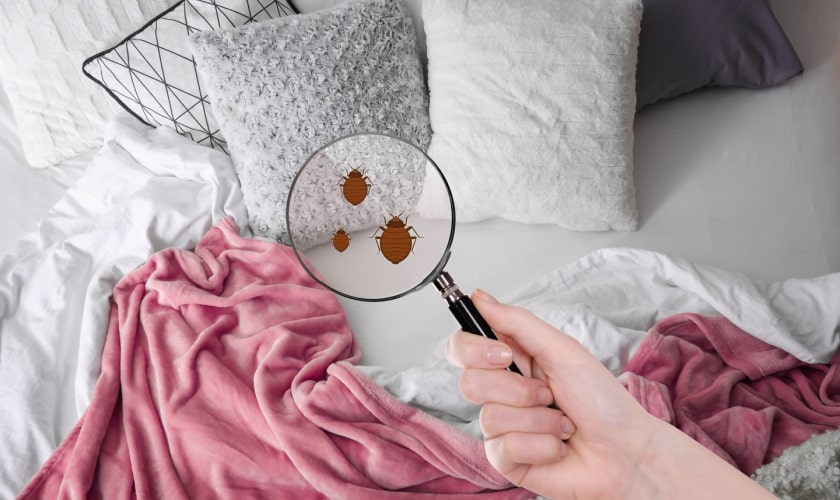Expert Kings Pest Control Services Cincinnati OH
Wiki Article
Kinds Of Insect Control: Which Technique Is Right for Your Infestation?
When confronted with an insect infestation, the selection of an appropriate approach for parasite control is critical in properly taking care of the circumstance. From chemical treatments to biological solutions, there exists an array of approaches that can be used to attend to different kinds of parasites. Each technique includes its own collection of factors to consider and advantages, making the decision-making process a nuanced one. Understanding the subtleties of each strategy and reviewing their compatibility with the specific parasite invasion at hand is essential for attaining lasting success in bug management. By discovering the different types of parasite control techniques available, people can make informed choices tailored to their one-of-a-kind scenarios, guaranteeing an extra efficient and lasting result in pest elimination.Chemical Parasite Control
Chemical insect control includes the usage of synthetic or naturally obtained chemicals to take care of and eradicate pest populations successfully. This approach is commonly used in farming, forestry, and household settings to fight a vast array of pests, including rats, weeds, and insects. Making use of chemical pesticides can supply fast and targeted options to pest problems, making it a preferred selection for many individuals and businesses.One of the essential advantages of chemical insect control is its capacity to promptly get rid of parasites, minimizing the threat of damages to plants, residential or commercial property, and human health and wellness. By utilizing particular chemicals that target specific insects, this technique can efficiently manage infestations while reducing harm to advantageous organisms and the environment when used appropriately.
Nevertheless, the use of chemical insect control also raises problems concerning prospective unfavorable effects on non-target varieties, water resources, and human health and wellness. It is vital to adhere to security guidelines, use chemicals properly, and think about alternative parasite control approaches to lessen these risks and ensure lasting insect management techniques.
Biological Pest Control
Organic insect control, also called biocontrol, uses living microorganisms to lower and handle parasite populaces naturally. This technique harnesses the power of nature to regulate insects without the demand for synthetic chemicals. Biocontrol can entail the introduction of all-natural enemies of the bug species, such as parasites, killers, or pathogens, to subdue pest populaces. By utilizing the insect's all-natural predators or microorganisms, organic pest control uses a lasting and ecologically pleasant remedy to pest management.
Mechanical Bug Control
Using physical and manual techniques to manage parasite populations, mechanical pest control uses an alternate approach that does not depend on the use of living microorganisms or synthetic chemicals. This approach includes the use of obstacles, traps, or various other devices to literally deter or remove insects. By obstructing insect access points or establishing traps to capture them, mechanical pest control can successfully decrease invasions without introducing chemicals into the setting.One typical instance of mechanical pest control is making use of mesh screens on doors and home windows to avoid bugs from going into structures. This easy yet effective approach acts as a physical obstacle, maintaining insects out while permitting for appropriate ventilation. In addition, devices like mousetraps, fly swatters, and ultrasonic repellents fall under the mechanical bug control classification.
While mechanical pest control techniques can be labor-intensive and require routine surveillance and maintenance, they internet use a lasting and environmentally friendly service for handling parasite infestations. By combining different mechanical methods, homeowner can create an extensive bug control approach that minimizes reliance on chemical pesticides.
Physical Insect Control

Some usual physical bug control methods consist of making use of obstacles such as screens or webs to stop pest access, traps to record and eliminate parasites, and hand-picking to literally remove bugs from plants or structures. In addition, techniques like warmth treatments can be utilized to control pests like bed pests by raising the temperature to levels that are dangerous to the bugs.
Physical parasite control is especially valuable in integrated bug management (IPM) methods, where numerous insect control techniques are click here for info combined for efficient parasite management while lessening making use of chemicals. By utilizing physical bug control strategies, individuals can efficiently resolve pest invasions with marginal ecological impact.
Integrated Insect Administration
When applying physical pest control techniques as part of bug monitoring strategies, Integrated Insect Administration (IPM) arises as a thorough approach that leverages various methods to successfully regulate pest populaces. IPM concentrates on lasting avoidance of pests through a combination of organic, social, physical, and chemical devices customized to specific pest issues. By integrating multiple control strategies, IPM aims to reduce the dangers connected with insects while likewise decreasing reliance on chemical services.One secret aspect of IPM is the emphasis on monitoring and assessing pest populaces to establish one of the most ideal control approaches. This positive technique permits early best treatment for subterranean termites intervention and targeted strategies, bring about extra reliable bug administration. Additionally, IPM promotes eco pleasant methods by prioritizing non-chemical control approaches and just utilizing pesticides as a last hotel.
Final Thought

By utilizing the insect's natural predators or pathogens, biological pest control provides a environmentally friendly and sustainable remedy to pest monitoring. - Kings cincinnati pest control
Making use of physical and hand-operated techniques to handle pest populaces, mechanical parasite control uses an alternate method that does not rely on the usage of living microorganisms or synthetic chemicals.An effective strategy to handling insect populaces without depending on chemical or biological approaches includes the use of physical parasite control methods.When executing physical pest control approaches as part of pest monitoring methods, Integrated Insect Monitoring (IPM) emerges as a comprehensive strategy that leverages different techniques to successfully control pest populaces. Chemical insect control entails the use of chemicals, biological pest control uses natural killers, mechanical pest control includes physical barriers, physical bug control consists of trapping or getting rid of insects, and incorporated insect monitoring combines numerous methods for an alternative approach to pest control.
Report this wiki page